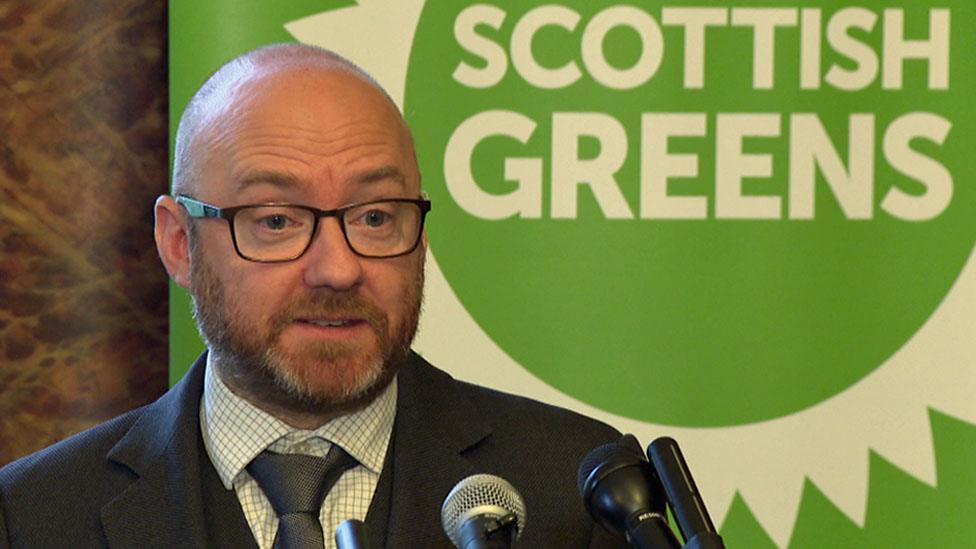General election 2019: Scottish Greens manifesto at-a-glance
- Published
Allow X content?
This article contains content provided by X. We ask for your permission before anything is loaded, as they may be using cookies and other technologies. You may want to read X’s cookie policy, external and privacy policy, external before accepting. To view this content choose ‘accept and continue’.
The Scottish Greens have unveiled their vision for Scotland ahead of the 12 December general election. The full document, which is available here, sets out the policies the party would aim to pass into law if they were in government.
Some areas, such as education or health, are devolved to the Scottish Parliament. This means the Scottish Greens would need to the win the support of the Scottish government or win the next Holyrood election in 2021 before the policy could be introduced.
The main policies from the party's 2019 manifesto are:
Green new deal to tackle the climate emergency and invest in the future
Support Scottish independence
Stop Brexit
Back Remain if there is a referendum on a Brexit deal
Environment and energy
The manifesto pledges to:
Accelerate the transition to a zero carbon economy
Develop a government-funded support scheme for renewables and reverse cuts to subsidies
Bring grid into public ownership
Make homes more energy efficient
Reduce emissions by 80% by 2030
Keep fossil fuels in the ground, including phasing out North Sea oil and gas extraction, and permanently ban fracking across the UK


It's no surprise that the climate emergency is at the heart of the Scottish Greens' manifesto. Indeed their repeated call is to "demand climate action".
But their central pledge is less ambitious than that of the England and Wales party which wants greenhouse gas emissions reduced to "net-zero" by 2030. The Scottish Greens want instead to see an 80% reduction by the same deadline.
To achieve that, the energy sector is firmly in their sights with a pledge to "keep fossil fuels in the ground" by phasing out North Sea oil and gas extraction. They want a permanent UK-wide ban on fracking and the closure of Scotland's two nuclear power stations.

Brexit
Supports the UK staying in the EU and will campaign for Remain if there is another referendum
Put a Withdrawal Agreement back to the people in a referendum, with Remain on the ballot paper
Want a Brexit deal to allow freedom of movement
Wants preservation of EU environmental regulations and those which protect human health, animal welfare, data and workers' rights
Scottish independence and democracy
Support Scottish independence
If the UK leaves the EU, indyref2 must be held before the end of any transition period
Encourage further devolution of powers from Westminster to Holyrood
Introduce proportional representation for all elections
Extend votes to 16-year-olds and all those normally resident in the country
Replace the House of Lords with an elected second chamber
Economy
Create 200,000 jobs for Scotland
Bring in a universal basic income
Abolish zero-hours contracts
Remove differential rates of minimum wage for under-25s and introduce a living wage for everyone
Phase in a four-day week
Scrap universal credit
Pensions support for the Waspi women (Women Against State Pension Inequality) and close the gender pay gap
Reduce wealth inequality with a tax on the wealthiest 1%, a land value tax, and limit pay inequality
Target investment towards communities that depend on fossil fuel extraction


Green politics has a paradox. The more successful the movement is in raising environmental awareness, the more mainstream parties respond, and the more Scottish Greens get squeezed.
So it has an increasing amount to say about other issues, including the economy. As with climate change, it tends to take the more radical approaches. Rather than offering a worked-out, costed plan for government, the intention is to push and pull other parties towards the green left.
A Green economy would shift tax towards incentives for changed behaviour and reduced environmental harm, backed by government spending and extended ownership of assets. It would push against inequality. A universal basic income is an easy case to make, but very challenging to introduce.
On wealth tax, Scottish Greens would go further than Labour. The parties agree on moving eventually to a standard four-day working week, though other workplace reforms are less influenced by trade unions. Both aim at extending free access to buses. Independence plays a less pivotal role in thinking than it does for the SNP, with more emphasis on reversing Brexit.

Transport
Long-term aim to provide free public transport for all, immediate aim to extend free bus travel to under-21s
Prioritise investment in a publicly-owned rail service, accessible municipal bus networks and make cycling and walking more accessible
Oppose tax breaks to the aviation industry
Oppose an extra runway at Heathrow
Reform Vehicle Excise Duty and end freeze on fuel duty
Healthcare
Support a free at the point of use NHS
Extend principle of free at the point of use to social care
Treat drug use as a health issue, not a crime

CONFUSED? Our simple election guide, external
POLICY GUIDE: Who should I vote for?, external
REGISTER: What you need to do to vote

Migration
Give refugees and asylum seekers an immediate right to work and an income
Extend students visas to allow work after graduation
Support the rights of EU citizens to live and work in the UK, and the right of those normally resident in the country to access health, education, housing, employment and social security services
Other notable policies:
Cancel Trident replacement
Oppose Nato membership
Reduce military spending and reorient towards defence and peacekeeping and humanitarian efforts
End the sale of arms to repressive regimes and end public funding of arms manufacturers
Make high-quality education universally available and equally accessible at all stages of life
Support rent controls
Extended LGBT+ and disabled people's rights
Support reform of gender recognition legislation
What do the other parties offer?
- Published25 November 2019

- Published11 December 2019
